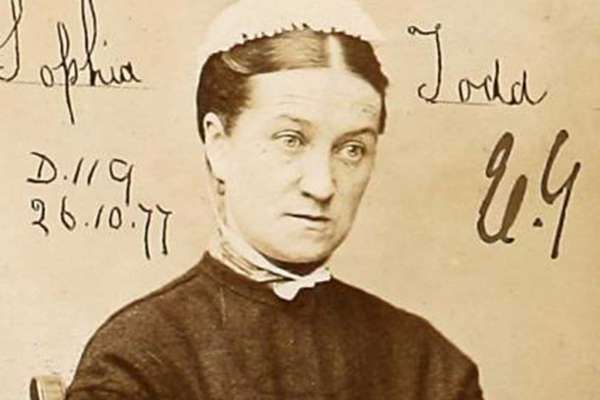In pictures
Policing and prosecution
In 1829 Sir Robert Peel established the first police force in Britain, the Metropolitan Police, which became the model for policing around the World. Our records of criminal activity include court records for high profile offences, as well as those committed by small-time crooks.
The Identity Parade in the Case of the Green Bicycle

- Date
- 1920
- Catalogue reference
- DPP 1/61
Ronald Light was the main suspect in what became known as the Green Bicycle Case.
Light was seen with 21-year-old Bella Wright on the evening of 5 July 1919 when they rode their bikes together in Little Stretton, Leicestershire. Light met Bella when she was on her way to visit her uncle’s cottage and he accompanied her there, waited for her afterwards and the pair rode off in the early evening. Bella’s body was later found with a single gun shot wound to her face.
Light maintained his innocence despite hiding his green bicycle, unspent bullets and his revolver holster in a nearby canal. He claimed that he panicked following the news of Bella’s death.
The trial jury were unable to convict Light beyond reasonable doubt, and he was therefore acquitted. Apparently, Bella’s death could have been caused by a stray rifle bullet which had ricocheted from some distance away.
The theft of the World Cup

- Date
- 1966
- Catalogue reference
- DPP 2/4167
England hosted the World Cup in 1966, and the drama surrounding the event that year began early. On 20 March, the Jules Rimet trophy was stolen while on display at a stamp exhibition at Central Hall in Westminster, London.
Subsequently Joe Mears, the Chairman of the Football Association, received a parcel containing the removable bowl from the top of the trophy and a letter demanding £15,000 in exchange for the trophy itself.
A police ‘sting’ operation revealed the author of the ransom note as Edward Betchley, a petty thief, who was chased and arrested. Bizarrely, the cup was found, on 27 March, by a dog named Pickles, while being taken for a walk by his owner David Corbett, in Norwood, South London.
The Jules Rimet Trophy had been wrapped in newspaper, and stuffed into a hedge. This exhibit photograph from Betchley’s trial shows the revered cup, complete with wrappings.
The Great Train Robbery

- Date
- 1963
- Catalogue reference
- ASSI 13/657
The Great Train Robbery occurred during the night of 7 August 1963. A Post Office train heading to London from Glasgow was stopped near Leighton Buzzard by a gang of 17 robbers including Ronnie Biggs and Buster Edwards.
The train crew were tied up and a total of £2.3 million was stolen from the train in 120 sacks. The gang transferred the money into a truck before making their getaway to a farm where they hid for a few days, using real money to play Monopoly while they planned their final escape.
Most of the robbers were eventually caught and given 30-year prison sentences in 1964, although a few evaded capture or fled abroad. Only £400,000 of the stolen money was ever recovered, but the audacity and scale of the plan ensured that the Great Train Robbery will always be remembered.
Recruiting Black police officers

- Date
- 1974–1975
- Catalogue reference
- HO 303/68
Please note this record includes terminology and attitudes about race and ethnicity now considered offensive. This language reflects government and societal attitudes at the time.
In 1974 there were around 101,000 police officers in England and Wales. Only 86 of these officers were non-white, or ‘coloured’ as the government referred to them at the time. This was considered a problem, with Employment Minister John Fraser worrying it would lead people of colour to view the police as a ‘distrusted white authoritarian institution’.
The government and police embarked on a publicity campaign to recruit more non-white police officers. The Central Office of Information helped place content in newspapers, on radio and television.
As of 2022, 15% of police officers are from black or minority ethnic backgrounds, and 6.7% of senior officers.
Featured article
The story of
Sophia Todd

Was a woman arrested for murder in Victorian Liverpool an unfortunate person caught up in a series of ill-fated events, or something much more sinister?